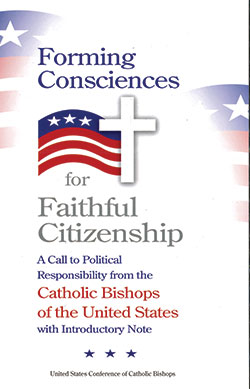Religious Education Supplement
‘Faithful Citizenship’ can help Catholics form consciences for election
By Sean Gallagher
 Glenn Tebbe has witnessed up close the nitty gritty work of politics in the halls and offices of the Indiana Statehouse in Indianapolis during the annual sessions of the state’s General Assembly.
Glenn Tebbe has witnessed up close the nitty gritty work of politics in the halls and offices of the Indiana Statehouse in Indianapolis during the annual sessions of the state’s General Assembly.
As executive director of the Indiana Catholic Conference (ICC), Tebbe is the public policy spokesperson for the Church in Indiana and an advocate for the Church’s view on promoting the common good among Hoosier lawmakers.
Voters across the state and nation will play their part in the difficult work of politics on Nov. 8 when they will choose a new president and a wide range of office holders at the state and local levels.
While Tebbe knows that this work often involves much learning and discussion—not to mention partisan wrangling—he also knows that prayer should come first as Catholic voters form their consciences for the election.
“In terms of forming your conscience, that’s a critical aspect,” Tebbe said. “Conscience is listening to God speaking to you about what the proper thing to do is at this time and in this circumstance in order to do good and avoid evil.
“Prayer is a time to listen. But prayer also includes seeking the truth about topics of concern through God’s word and the Church’s teaching. All of those are essential steps that help one to form one’s conscience. Prayer is part of all that.”
An important resource to help Catholics across central and southern Indiana and across the nation prayerfully prepare to participate in the upcoming election is “Forming Consciences for Faithful Citizenship,” which the
U.S. bishops revise and re-issue during presidential election years and is available online at usccb.org and
www.archindy.org/faithfulcitizenship.
“It’s a great summary of Catholic social teaching and the pertinent issues with regard to our obligations to civic responsibility,” Tebbe said. “And it does a nice job of overviewing the salient issues that we should be thinking about regarding candidates and their impact on these issues.”
“Faithful Citizenship” encourages Catholics to be involved in public life and to apply their faith to public policy issues. It also explores the basic principles of Catholic social teaching, and applies them to issues affecting political campaigns today. Finally, it helps Catholics determine how to balance the call to do good and avoid evil in the political process.
“For anybody that’s serious about this, it’s written in such a way that it’s easily understood,” Tebbe said. “And it’s broken up into parts. You can sit down with it and take your time. You can read it in pieces. An adult education class can do it over several weeks.”
Holy Family Parish in New Albany has sponsored a series of study sessions of “Faithful Citizenship” this summer. Zachary Mocek, pastoral associate at the New Albany Deanery faith community, has led the sessions and posted online video summaries of them on YouTube.
He has used study guides for “Faithful Citizenship” that are posted at usccb.org for the sessions that include Scripture readings, prayer and discussion on various sections of the document.
“You don’t have to give an hour-long lecture on what this is,” Mocek said. “You come together for 60 to 90 minutes to pray together and discuss these highlighted points [in the study guide]. It’s very beneficial.”
In addition to the study guides, four bulletin inserts on “Faithful Citizenship” are available at usccb.org.
“That’s something that I think all parishes should distribute,” Tebbe said. “It’s relatively inexpensive to do.
“There’s just a plethora of things for parishes, parish leadership and individual people. They can download the resources and use them in reflection, conscience formation and prayer. It’s out there for everybody to use.”
Ken Ogorek, archdiocesan director of catechesis, said “Faithful Citizenship” effectively applies the wisdom of Scripture and the teachings of the Church to the concrete circumstances of the political process.
“This resource brings those two ingredients together and allows us to reflect on issues of the day in light of God’s outreach to us in Scripture, and in various teaching documents of the magisterium, both not-so-new and those that are very current,” he said.
In leading members of Holy Family Parish in reflecting on “Faithful Citizenship,” Mocek always returns to the critical part that prayer should play in their participation in public life.
“That’s the most important part of it,” he said. “We gather all of the information, and then we talk to God about it and we pray about it. How do we know what to do, and how do we know what he wants us to do if we don’t talk to him? That’s been a major highlight at the end of each session. I re-emphasize the prayer part of it.” †
Related story: Tebbe notes importance of voting despite candidates with “very serious flaws”
